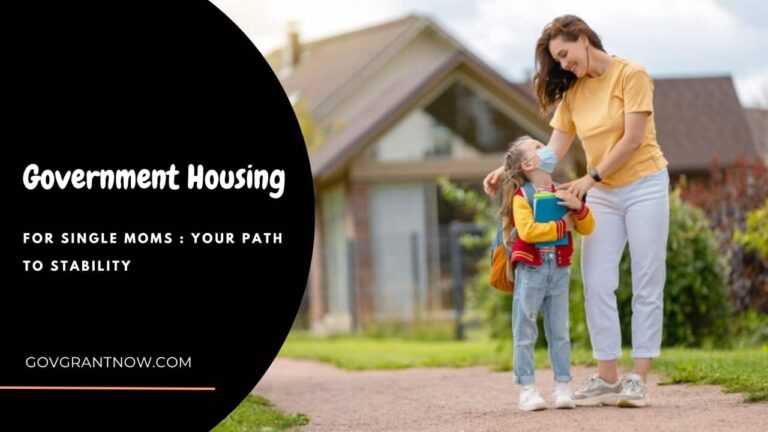For many single mothers, securing a safe and affordable home is a top priority, yet it often presents significant challenges. Recognizing this, various government housing programs for single moms and single dads have been established, offering a lifeline to those in need.
These initiatives are specifically designed to support the unique needs of single-parent families. They provide not just shelter, but a stable environment where single moms can thrive and build a better future for their children.
This guide explores the essentials of government housing for single moms, highlighting how these programs can offer substantial relief from the financial pressures of housing and create pathways toward long-term stability and independence.
Table of Contents
Does the Government Help Single Moms with Housing Assistance?
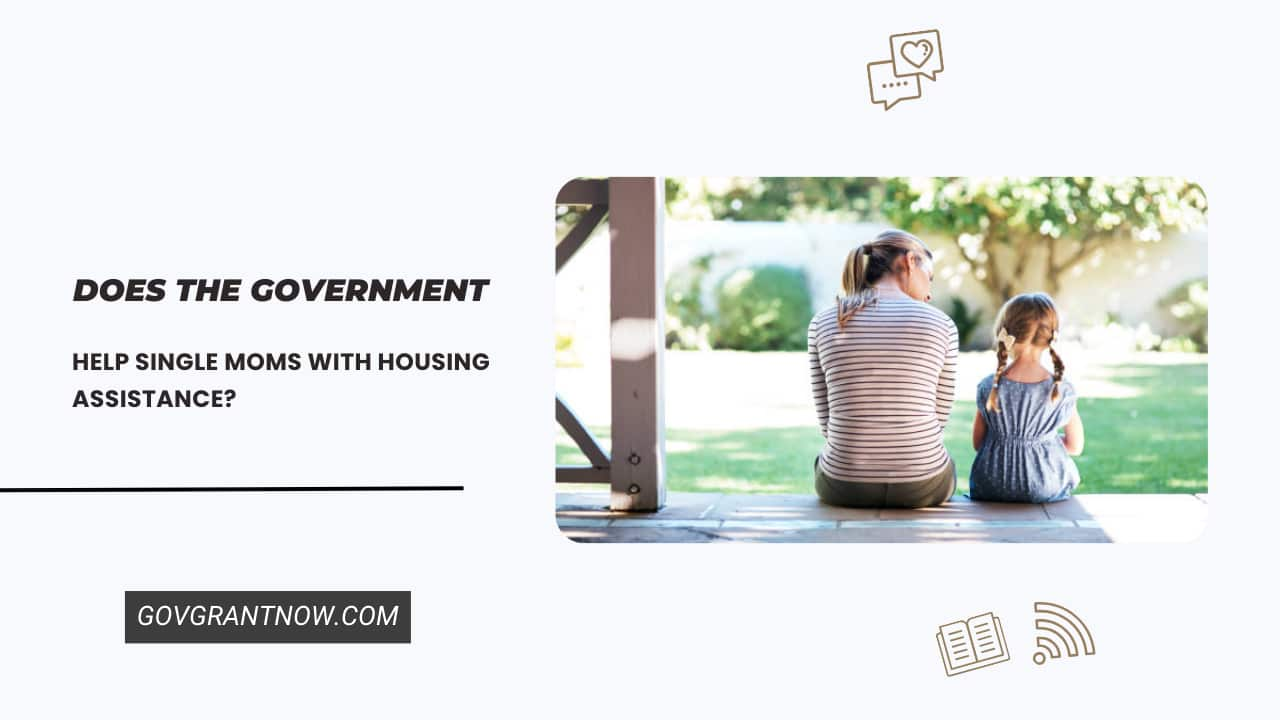
Yes, the government does offer housing assistance to single moms.
The government aids single moms in securing affordable housing primarily by subsidizing rental costs and providing access to low-cost housing units.
This assistance significantly reduces the financial burden on single mothers, allowing them to allocate more resources towards other necessities like food, healthcare, and education for their children.
Key aspects of this support include rental assistance, which lowers the amount single moms have to pay for rent, and affordable housing options, ensuring access to safe and cost-effective living spaces.
These efforts are crucial in helping single moms maintain stable and secure homes for their families.
Eligibility Criteria for Getting Government Housing for Single Moms
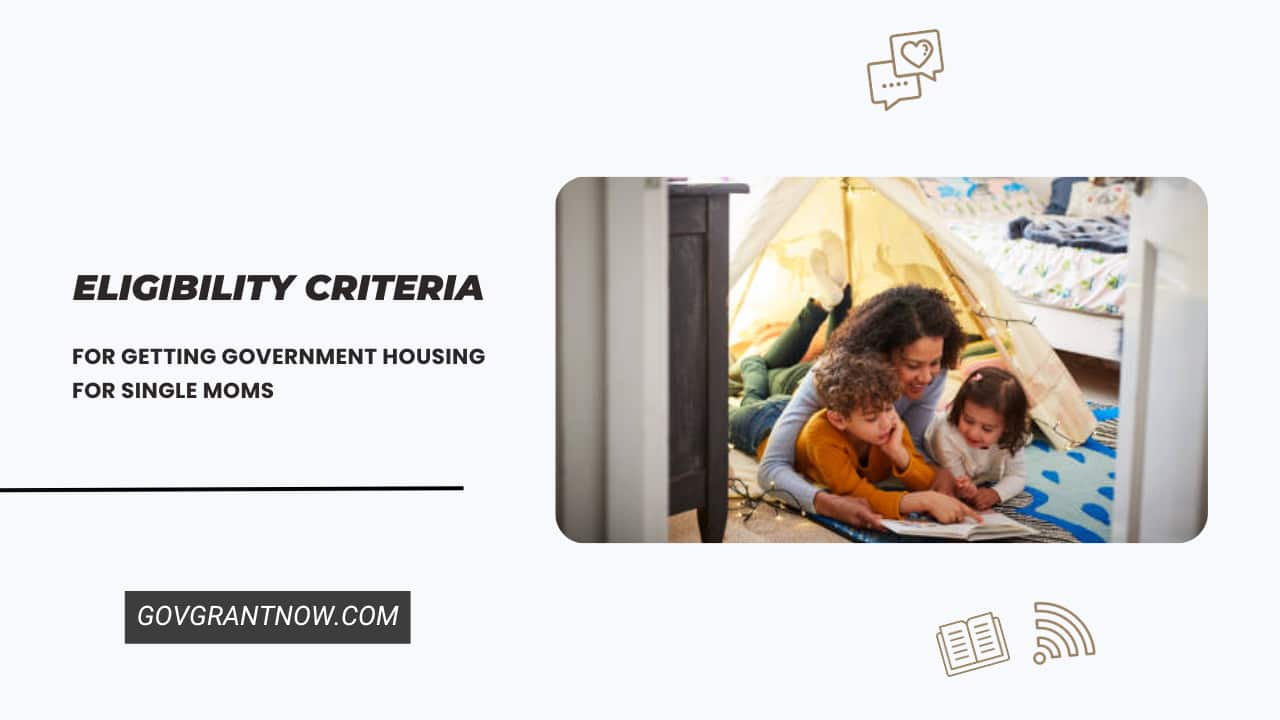
To qualify for government housing assistance as a single mom, there are specific eligibility criteria that must be met.
Here are the eligibility criteria for getting government housing for single mothers:
- Income Requirements: Your income must typically be below a certain level, often determined as a percentage of the area’s median income or federal poverty guideline. This is to ensure that assistance is provided to those who need it most.
- Family Status: Priority is often given to households with dependent children. Being a single mom with one or more children under a certain age can be a key factor in eligibility.
- Citizenship or Eligible Immigration Status: Applicants must usually be U.S. citizens or have eligible immigration status to qualify for government housing programs.
- Rental History: A good rental history, including no serious lease violations, can be important for eligibility.
- Other Factors: Some programs may consider additional factors like the age and number of children, disability status, and current living conditions.
Also Read: List of Churches That Will Help You Pay Your Rent
Government Programs That Provide Housing Assistance for Single Moms
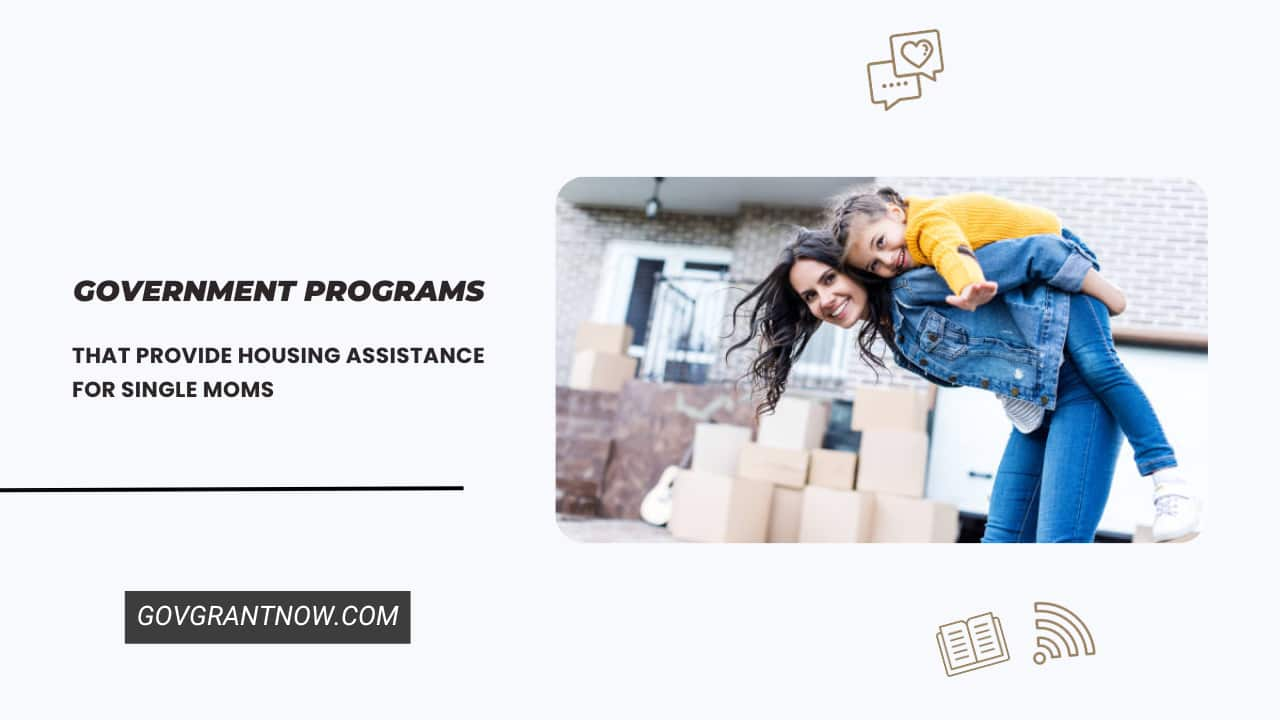
The government offers several types of housing assistance for single moms.
These programs are designed to provide financial relief and stable housing solutions to single mothers facing economic challenges.
Here are some government programs that help with housing for single moms:
1. Section 8 Housing for Single Moms
Section 8 Housing Choice Vouchers are a vital resource for single moms, offering them flexibility and assistance in finding affordable housing.
This program allows single mothers to choose their own housing in the private market, while a portion of the rent is subsidized by the voucher.
Additionally, some luxury apartments accept Section 8 vouchers, providing security and convenience to single mothers.
This significantly reduces the financial burden of housing costs, providing single moms with more options to find safe, suitable homes in neighborhoods of their choice, thereby enhancing their ability to create stable and nurturing environments for their children.
2. Public Housing for Single Moms
Public Housing provides another essential avenue of support for single moms seeking affordable housing options.
These are government-subsidized housing units, typically managed by local housing authorities, providing safe and cost-effective living spaces.
Public housing is designed to accommodate the needs of low-income families, including single mothers, ensuring they have access to housing that is not only affordable but also meets basic standards of quality and safety, thus contributing significantly to their overall well-being and stability.
3. Subsidized Housing for Single Moms
Subsidized Housing is a key component of government assistance programs, designed to make housing more affordable for low-income individuals, including single moms.
This initiative is a ray of hope for single moms those seeking low-income housing for single mothers.
In this arrangement, a portion of the rent is paid by the government, reducing the amount the tenant needs to pay.
This type of housing is crucial for single mothers who are balancing the financial demands of raising a family on a single income, as it provides them with access to safe, decent, and more financially manageable living spaces.
Subsidized housing helps in alleviating the stress of high housing costs, contributing to greater stability and security for single-parent families.
4. Home Grants and Loans Program
Home Grants and Loans are significant forms of support for single moms looking to purchase or renovate their homes.
These programs are part of the Home Grant for Single Moms, which provides financial assistance either as a full grant that does not require repayment or as a loan with favorable terms.
They are designed to make the dream of owning a home more attainable for single moms, helping to cover costs like down payments, home repairs, or renovations, thereby fostering long-term stability and a sense of security for their families.
5. State and Local Programs
State and Local Programs play a crucial role in supplementing federal efforts in providing housing assistance to single moms.
These programs often fill gaps not covered by federal initiatives, providing additional resources like specialized rental assistance, affordable housing developments, and unique home-buying support.
They are crucial for single moms who may need more localized and personalized assistance, ensuring that a wider array of housing needs are met within different communities.
6. Emergency Housing Assistance for Single Moms
Emergency Housing Assistance is a critical resource for single moms facing immediate and urgent housing needs.
This program steps in during crises such as natural disasters, eviction, or situations of domestic violence, providing temporary shelter and support.
It’s designed to offer a rapid response and a safe haven for single mothers and their children during times of instability, ensuring they have access to immediate housing solutions while they work towards more permanent arrangements.
7. Homelessness Prevention Programs
Homelessness Prevention Programs serve as a crucial safety net for single moms, aiming to avert the risk of homelessness through proactive support and resources.
These programs offer a blend of financial assistance, counseling, and intervention strategies, tailored to help single mothers maintain stable housing.
By addressing potential housing challenges early, these programs play a vital role in ensuring that single moms and their families have the support they need to stay in their homes and avoid the uncertainties of homelessness.
Also Read: Apartments With No Application Fee Near Me
Application Process for Getting Government Housing for Single Moms
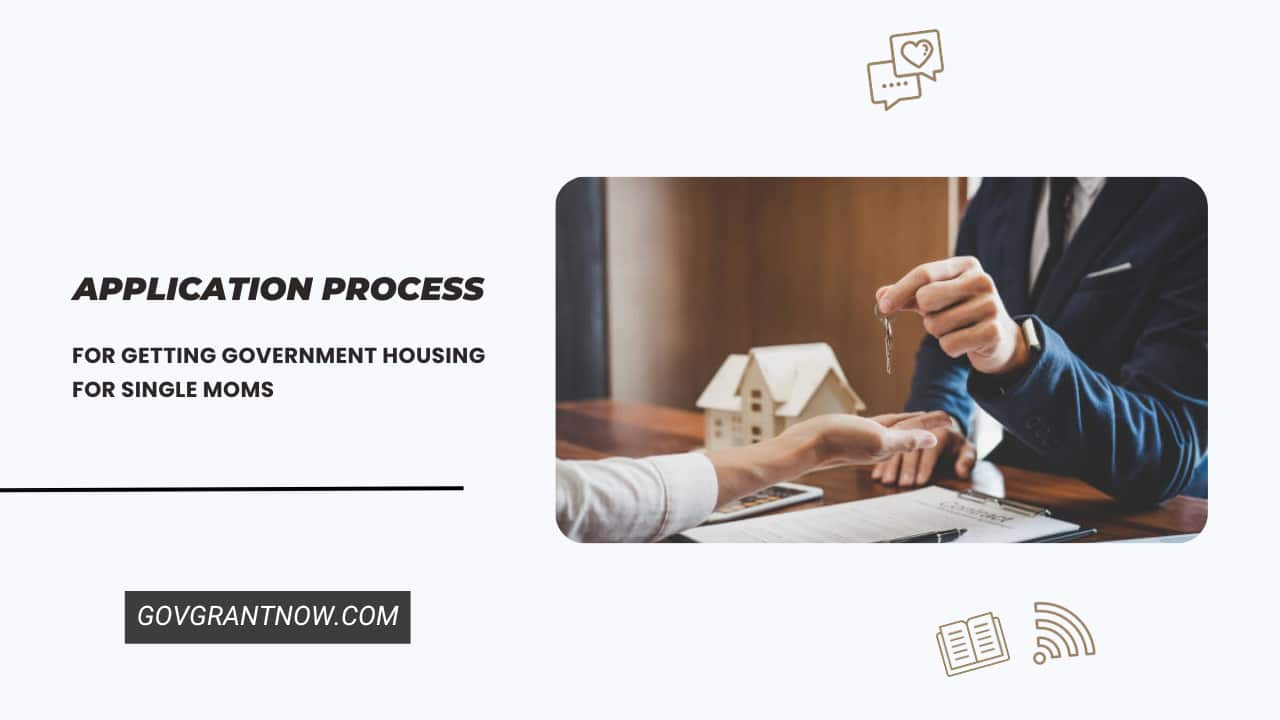
The application process for government housing assistance programs can vary depending on your location and the specific program you are applying for.
However, here are some general steps to get government housing for single moms:
- Research Programs: Begin by researching the available government housing assistance programs in your area. This might include Section 8 housing vouchers, public housing, or state and local programs.
- Check Eligibility: Review the eligibility criteria for the program you are interested in. This may include income limits, family size, citizenship status, and other factors. Ensure you meet the requirements.
- Contact Local Housing Authority: Get in touch with your local housing authority or agency responsible for the program you want to apply for. They can provide detailed information about the application process, required documents, and waiting lists.
- Gather Documents: Prepare the necessary documents, which may include proof of income, identification, and any other required paperwork. Make copies to submit with your application.
- Complete Application: Fill out the application form for the housing assistance program. Be thorough and accurate in providing information. You can typically obtain the application from the housing authority’s office or website.
- Submit Application: Submit your completed application along with the required documents to the housing authority by the specified deadline. Keep copies of everything for your records.
- Wait for Processing: After submitting your application, it will be reviewed by the housing authority. Depending on demand and available resources, there may be a waiting period.
- Interview: You may be asked to attend an interview as part of the application process. Be prepared to discuss your housing needs and provide additional information.
- Receive Notification: You will receive a notification from the housing authority regarding the status of your application. If approved, you will be provided with details about your housing placement and any rent responsibilities.
- Maintain Communication: Stay in communication with the housing authority throughout the process and during your stay in government-assisted housing.
Also Read: Grants and Charities That Help Pay Property Taxes
Additional Support and Resources for Single Moms from the Government
In addition to housing assistance, the government provides various support programs and resources tailored to the needs of single moms and their families, such as:
- Supplemental Nutrition Assistance Program (SNAP): SNAP, formerly known as food stamps, helps low-income individuals, including single moms, purchase nutritious food for their families.
- Temporary Assistance for Needy Families (TANF): TANF offers financial assistance, job training, and childcare services to eligible single moms to help them achieve self-sufficiency.
- Childcare Assistance: Many states offer childcare subsidies or vouchers to assist single moms in accessing affordable childcare services, allowing them to work or attend school.
- Medicaid: Medicaid provides healthcare coverage for low-income individuals and families, ensuring that single moms and their children have access to essential medical services.
- Earned Income Tax Credit (EITC): EITC is a tax credit that provides financial assistance to working single moms, helping to boost their income.
- Women, Infants, and Children (WIC) Program: WIC provides nutrition education, healthy food, and support for pregnant women, infants, and young children in low-income families.
- Job Training and Employment Services: Various workforce development programs offer job training, employment counseling, and job placement services to assist single moms in finding stable employment.
- Legal Aid Services: Government-funded legal aid programs offer assistance with issues such as child custody, child support, and domestic violence, providing critical support to single moms facing legal challenges.
- Education Grants and Scholarships: Some government programs and scholarships are specifically designed for single moms pursuing higher education to improve their career prospects.
- Housing Counseling: Housing counseling services can help single moms with budgeting, credit repair, and navigating the housing market effectively.
- Community and Support Services: Local community centers and non-profit organizations often receive government funding to provide a range of services, including counseling, support groups, and parenting classes for single moms.
Suggested Post :-
- Grants for Windows and Doors from Government
- Government Grants for Roof Replacement
- Houses For Rent No Credit Check No Deposit Near Me
- How to Get Free Hotel Vouchers for the Homeless?
- Income Restricted Apartments Near Me
- List of Churches That Help with Motel Vouchers Near Me
- Getting Free Baby Stuff and Samples for Your Baby
Conclusion:-
For many single mothers, securing a safe and affordable home is a top priority, yet it often presents significant challenges. Recognizing this, various government housing programs for single mothers have been established, offering a lifeline to those in need.
These initiatives, including Section 8 housing for single moms and government-funded housing for single mothers, are specifically designed to support the unique needs of single-parent families. They provide not just shelter, but a stable environment where single moms can thrive and build a better future for their children.
This guide explores the essentials of government housing for single moms, highlighting how these programs can offer substantial relief from the financial pressures of housing and create pathways toward long-term stability and independence.
Frequently Asked Questions:
How Do I Know If I’m Eligible for Government Housing Assistance?
Eligibility is based on factors like your income, family size, and specific needs. Contact your local housing agency for specific criteria.
What Documents Do I Need to Apply for Housing Assistance?
Generally, you’ll need proof of income, identification, and documentation of family size. Each program may have additional requirements.
How Long Does It Take to Get into a Housing Program?
This varies widely depending on the program and your location. Some programs have long waiting lists, so it’s advisable to apply as soon as possible.
Can I Choose Where I Live with Housing Assistance?
In programs like Section 8, you have more flexibility to choose your housing, as long as it meets certain criteria set by the program.
Are There Any Housing Programs Specifically for Single Moms?
While most housing programs are not exclusively for single moms, many give priority to single-parent families due to their unique needs.
What Happens If My Income Changes After I Receive Housing Assistance?
You should report any changes in income to your housing agency, as it may affect your eligibility or the amount of assistance you receive.
Can I Get Assistance with Utilities in Government Housing?
Some programs include utility assistance, but it varies. Check with your housing agency for specific details.
